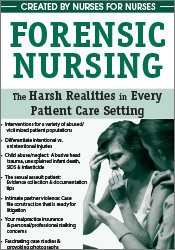

Increasing violence and litigation are rampant in our society. Every nurse must have a baseline concept of the prevalent types of abuse/maltreatment in order to provide compassionate and comprehensive care, as well as brace themselves for the inevitable exposure to the legal system (civil, criminal, human rights). Forensic nursing is an exploding and exciting sub-specialty of nursing. Many find this not only an interest, but a compelling method of holistic patient care. Acquiring a distinctive skill set based on evidence-based practice allows nurses to make valuable and unique contributions in and beyond the typical practice setting. The content presented in this one-day course will equip you to identify and intervene with abused/victimized patients, learn from valuable assessment tools, review various charting examples and take a close look at a plethora of photos and case studies. Very few nurses were trained in legal matters; therefore, this is a critical knowledge update that addresses current trends in risk management and application to practice in order to mitigate negative outcomes.
NOTE: Tuition includes one free CE Certificate (participant will be able to print the certificate of completion after completing the on-line post-test (80% passing score) and completing the evaluation).
Continuing Education Information: Listed below are the continuing education credit(s) currently available for this non-interactive self-study package. Please note, your state licensing board dictates whether self-study is an acceptable form of continuing education, as well as which credit types are acceptable for continuing education hours. Please refer to your state rules and regulations. If your profession is not listed, please contact your licensing board to determine your continuing education requirements and check for reciprocal approval. For other credit inquiries not specified below, please contact cepesi@pesi.com or 800-844-8260 before the event.
Materials that are included in this course may include interventions and modalities that are beyond the authorized practice of your profession. As a licensed professional, you are responsible for reviewing the scope of practice, including activities that are defined in law as beyond the boundaries of practice in accordance with and in compliance with your profession's standards.
PESI, Inc. is a provider approved by the California Board of Registered Nursing, Provider #: 17118 for 6.0 self-study contact hours.
** You will need to provide your license number to PESI. PESI must have this number on file in order for your hours to be valid.
PESI, Inc. is an approved provider by the Florida Board of Nursing. Provider #: FBN2858. These materials qualify for 6.0 self-study contact hours.

PESI, Inc. is an approved provider by the Iowa Board of Nursing. Provider #: 346. Nurses successfully completing these self-study materials will earn 7.6 self-study contact hours. Please email cepesi@pesi.com with your license number, include the title, speaker name and date. PESI must have this number on file in order for your hours to be valid.
This self-study activity qualifies for 6.25 continuing education clock hours as required by many national, state and local licensing boards and professional organizations. Save your activity advertisement and certificate of completion, and contact your own board or organization for specific requirements.
| File type | File name | Number of pages | |
|---|---|---|---|
| Webcast Manual (2.67 MB) | 148 Pages | Available after Purchase |

Dr. Pamela D. Tabor, DNP-Forensics, AFN-BC, serves as a consultant and expert witness in the private sector and for the Department of Defense in military trials. She has testified before the legislature on numerous occasions, has consulted at the Pentagon, served as the director for the Arkansas Infant & Child Death Review Program and developed the Sudden Unexplained Infant Death Investigation Training Program in Arkansas. Pamela holds a Doctor of Nursing Practice degree with a forensic focus, is a Board-Certified Advance Forensic Nurse and has an Advance Health Specialty Forensic Science Certification. She is a Certified Law Enforcement Standards and Training Instructor and a Fellow with the International Association of Coroners and Medical Examiners.
She served two terms on the board of Directors for the International Association of Forensic Nurses and earned the Distinguished Fellow award. Pamela has published articles in peer-review journals, authored a book chapter in Core Curriculum for Forensic Nursing and is currently working on a chapter about stalking for the Academy of Forensic Nurses.
Speaker Disclosures:
Financial: Pamela Tabor maintains a private practice. She receives a speaking honorarium from PESI, Inc. She has no relevant financial relationships with ineligible organizations.
Non-financial: Pamela Tabor is a member of the Academy of Forensic Nurses, Medicolegal Death Investigation Committee and the International Association of Coroners and Medical Examiners.
Access never expires for this product.
Visit our FAQ page at www.pesi.com/faq or contact us at www.pesi.com/info
Clinically Relevant Identification of Intentional vs. Unintentional Injuries
Trending Issues in Child Abuse and Neglect
Advanced Skills to Assess the Sexual Assault Patient
Intimate Partner Violence (IPV): Recognition, Evidence-Based Practices and Case File Construction
Trending Risk Management Issues
Vicarious Traumatization (VT)
| 5 |
|
| 4 |
|
| 3 |
|
| 2 |
|
| 1 |
|
Satisfaction Guarantee
Your satisfaction is our goal and our guarantee. Concerns should be addressed to: PO Box 1000, Eau Claire, WI 54702-1000 or call 1-800-844-8260.
ADA Needs
We would be happy to accommodate your ADA needs; please call our Customer Service Department for more information at 1-800-844-8260.
PESI Mobile App
Access CE trainings on your phone or tablet through our free mobile app. Choose video or audio-only versions of online courses from the world’s best instructors, and complete your CE requirements anywhere, anytime, at your own pace.
Please wait ...